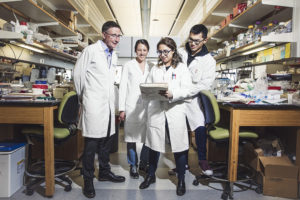
Postdoctoral researchers at USC are a major driver of research progress and represent future leaders in the biomedical sciences. Despite this, most USC postdocs lack a formal mentoring plan and committee akin to what has been developed for PhD students and junior faculty. The goal of this mentoring plan is to guide the scientific and career development of each postdoctoral fellow such that they can best transition to an independent faculty position, industry job or other scientific career.
1. Formal mentoring committee
Each postdoctoral fellow will create a mentoring committee composed of 3 faculty members: (1) their primary mentor; (2) a faculty member with whom their research overlaps; and (3) a senior faculty member with a track record of placing postdocs in attractive positions. For those with clinical projects, mentors with MD/PhDs or practicing physicians are encouraged. The role of the secondary mentor is several fold. First, they provide advice on the project from the perspective of a different field/expertise, thereby enriching the scientific potential of the project. Second, they increase the breadth of networking possibilities for the fellow. They may also become co-mentors, though this is not essential. The postdoc will work with their mentors to develop an initial career development plan (within the first 3 months) that establishes clear expectations. The committee will meet with the fellow at minimum once per year, and ideally twice per year for a mentoring meeting. The postdoctoral researcher will discuss research progress and future plans, networking opportunities (e.g., conferences and seminars), career advancement training and challenges they face from an academic or personal perspective. At the end of the meeting, recommendations made by the committee regarding research focus and career development will be summarized in an annual development plan that serves as the basis for subsequent meetings.
2. Cross-fertilization of ideas through attending co-mentor’s lab meetings
Postdocs are strongly encouraged to attend the lab meetings of their co-mentors, or closely overlapping mentors. This may be on a regular basis or when their research interests more closely align.
3. Guidance on postdoctoral grant applications, scientific writing and communication
The mentor committee will give critical feedback on NIH fellowship and private postdoctoral fellowship grant applications. For many, the mentoring committee will be instrumental in developing in-depth mentoring and training plans for K99/R00 applications. Mentors will also help identify workshops and training opportunities to more broadly develop effective communication.
4. Training on research-related and transferable skills
Postdocs will have the opportunity to participate in workshops on topics such as leadership, research integrity and entrepreneurship, as well as to take select courses with tuition waived, including scientific writing courses, teaching and supervising courses. Anthony Carlos in the Office of Postdoctoral Affairs can assist postdocs in registering for courses: carl589@usc.edu. Access to these training opportunities will endow the postdoctoral fellow with important skills to compete in the academic and non-academic job market.
5. Transition to the faculty phase
A postdoc’s transition to their next position is the most challenging step in a research career. We consider it our responsibility to prepare and support this transition. USC Stem Cell runs an annual series of workshops for senior postdocs aimed at transitioning to a faculty position. This includes academic mentors and other faculty giving constructive and detailed feedback on the fellows’ research statements, scientific practice talks and chalk talks, and learning how to negotiate job offers. Postdocs who are actively on the job market will be given the opportunity to observe the search procedure for prospective new USC Stem Cell faculty.
6. Transition to a non-academic position
We will establish a dedicated Advisory Board consisting of leading alumni working in different sectors of the scientific workforce. The Advisory Board will convene once per year to advise fellows during the career symposium.
For additional resources, please also see the website for the Keck School of Medicine Office of Postdoctoral Affairs.